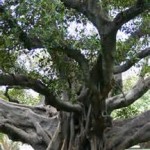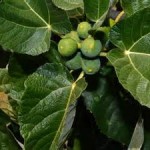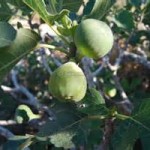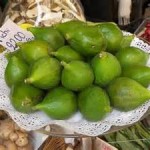The message of the withered fig tree contains a profound lesson for us today.
IT’S WORTH CONSIDERING
While the fig tree is used to represent the nation of Israel, it is much more than a symbol. In both Old and New Testament times, it was the favorite of all trees and was known for its fruit, its shade, and its beauty. It could grow to 20 feet in height with a canopy approaching thirty feet wide. In the Old Testament it came to represent peace and prosperity, for many O.T. writers pictured a time when every man would sit under his own vine and his own fig tree (1 Kings 4:25; Micah 4:4; Zechariah 3:10). So we see the fig tree as representing the nation of Israel living in peace and prosperity, enjoying the fruit of his labors.
Another interesting fact about the fig tree is that it goes through two fruit-bearing cycles every year. Around June and again in September it produces a crop of both leaves, flowers, and figs at the same time. The account of Jesus cursing the fig tree (Mark 11:12-14, 20-21) happens in April during Passover, a time when a fig should only be exhibiting small buds at the ends of the branches, but no leaves, flowers, or figs. Yet, this tree was full of leaves…in April. Jesus looks for figs, which should accompany the leaves, but finds none. It wasn’t the season for figs. So why did He curse the tree for not producing figs when it wasn’t the right season for figs?
September it produces a crop of both leaves, flowers, and figs at the same time. The account of Jesus cursing the fig tree (Mark 11:12-14, 20-21) happens in April during Passover, a time when a fig should only be exhibiting small buds at the ends of the branches, but no leaves, flowers, or figs. Yet, this tree was full of leaves…in April. Jesus looks for figs, which should accompany the leaves, but finds none. It wasn’t the season for figs. So why did He curse the tree for not producing figs when it wasn’t the right season for figs?
AS I SEE IT
Now that we know the fruit-bearing cycles for the fig tree, another question seems more important: Why did the tree produce leaves out of season? God has appointed a season for the leaves, the figs and the flowers, and this was not one of those seasons. What kind of tree violates the God-ordained seasons of nature? What kind of tree violates the will of God?
Now the story starts to make more sense. I don’t think Jesus cursed the tree for not having figs. I think He cursed it for violating its God-given purpose—of bearing fruit in its proper season. It had decided to do things its own way. It looked good—full of leaves, but it bore no fruit and Jesus cursed it. Remember that the fig tree represents nation of Israel, which God created for one reason—to be the people and nation through which God’s anointed would come. They were to welcome Him and present Him to the world. Instead, they were about to crucify Him.
its God-given purpose—of bearing fruit in its proper season. It had decided to do things its own way. It looked good—full of leaves, but it bore no fruit and Jesus cursed it. Remember that the fig tree represents nation of Israel, which God created for one reason—to be the people and nation through which God’s anointed would come. They were to welcome Him and present Him to the world. Instead, they were about to crucify Him.
The lessons, of course, don’t stop there. The fig tree and its representation of Israel served as object lessons for us as well as Israel. The tree had leaves. The presence of leaves was normally an indication that figs were also present. On this tree there were none. It was all show with no fruit. The Jewish nation professed faith in God, but was about to crucify His Son. What a picture of profession without practice—all talk and no walk—look good on the outside without producing anything of value.
A look through history shows that Jesus’ curse of the fig tree has been equally applicable to the Church. During his early days in South Africa, Gandhi decided to take a close look at Christianity to see if it held the answers to his questions. After attending a Christian church for several Sundays he concluded that the congregation didn’t seem particularly religious or devout. Instead they seemed to be worldly-minded people attending church for recreation and out of custom. He concluded that Christianity offered him nothing that he didn’t already possess. Consequently, he became lost to the Christian Church and India was robbed of a powerful Christian influence that would have radically changed its future.
South Africa, Gandhi decided to take a close look at Christianity to see if it held the answers to his questions. After attending a Christian church for several Sundays he concluded that the congregation didn’t seem particularly religious or devout. Instead they seemed to be worldly-minded people attending church for recreation and out of custom. He concluded that Christianity offered him nothing that he didn’t already possess. Consequently, he became lost to the Christian Church and India was robbed of a powerful Christian influence that would have radically changed its future.
If Gandhi was alive today and he inconspicuously slipped into a few of your church’s services, what would he find? All leaves and no fruit? Leaves and fruit, but out of season? Or would he find leaves, flowers and fruit, in season? Would he see enough to convince him that Christianity really does hold the answer to his questions? Would he hear heart-felt prayers of people desperate to hear from the living God? Would he hear life-changing truth from God’s Word accompanied by Holy-Spirit led conviction? Would he be led into his own personal encounter with the Son of the Living God—an encounter that would leave him forever changed?
Just as God’s rejection of Israel was only temporary (see Romans 11), God’s mercy will trump our disobedience if we recognize how far we’ve fallen, truly repent, and correct course. Jesus said that He will build His Church, but He meant His way, not our way. Let’s use whatever time we have left to become like the fig tree that bears its fruit in season—fruit that will last forever.
how far we’ve fallen, truly repent, and correct course. Jesus said that He will build His Church, but He meant His way, not our way. Let’s use whatever time we have left to become like the fig tree that bears its fruit in season—fruit that will last forever.





Leave A Comment